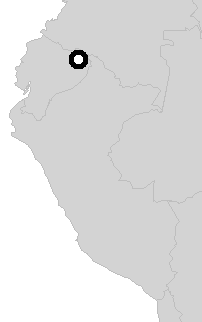
| www.CuriousTaxonomy.net |
|
The Flood in World Myth and Folklore
Andes |
| © 2021 Mark Isaak |

One night a sorcerer got angry with Munditi, a big wattled curassow (Crax globulosa). Looking for it to kill it, the man went into the forest following its singing. When he approached, he saw that the singing came not from the bird but from a spirit called "Munditi Supai." This devil was walking in the tree, jumping from branch to branch, singing. He looked like a priest.
The man returned to his house but soon fell ill. Some of his family went to see him, and he told them how he had followed the Munditi Supai and found him singing. They went to look for themselves. In the hollow trunk of a tree called Chunchu (Terminalia amazonia), they found the Munditi, looking like a priest. They set fire to the tree to kill him. When the tree fell, they saw that it had been Amarun, the boa! The eggs of the boa also fell across the ground. The younger brother of one man wanted to eat them, and, although he was told that it was dangerous, he cooked them and ate them. Once finished, he was tortured by a terrible thirst. He swallowed all the water of a small creek, and then another and another, until his belly was huge, as though about to burst. He said to his brother, "Brother, go above this area and wait listening. I am about to burst." The man went away as the brother told him. "Taaaan!", the noise was heard of the belly bursting from so much water. "Huán huán huán huán huán," the toads started singing on all sides. A big, black lagoon remained in the middle of the forest. They gave it the name of Canjuan cucha. It is a lagoon of black, ugly water, next to the river Rutunu.
Alessandra Foletti-Castegnaro, Tradicion Oral de los Quichuas Amazonicos del Aguarico y San Miguel, Colección 500 Años 59 (Quito, Ecuador: Ediciones ABYA-YALA, 1985 and 1992; Rome: MLAL, 1992), 111.

Meat that was stored in a house was going missing. When one of the brothers who lived there hid and watched, he saw a snake take the meat with its tail, eat it, and return to the hollow trunk of a tree. He told his brother, who said they should burn the snake.
In the morning, they built a fire around the base of the hollow tree, and they returned in the evening. The snake was well burnt, and its meat smelled good, like cooked catfish. One of the brothers went to eat some of it.
"Beware," his brother warned. "It will bring us much trouble."
But the first brother ignored him and ate. Immediately he was very thirsty. He drank and drank more and more water, and his belly swelled and swelled.
He said, "Brother, you were right. I will burst soon and turn into a tadpole. Then place me in a pilchi gourd and take me to the house, and place me next to the spring where you drink."
On hearing this, the other brother climbed a ceibo (cockspur coral tree, Erythrina crista-galli). He sat at the top of the tree, sad in thought, waiting. Then close to midnight his brother burst, releasing a sea of water that reached high, almost up to his feet. He took chonta seeds and periodically threw them into the water, listening to hear how low the water was dropping. When he heard the seeds fall on dry land, he climbed down from the tree.
Looking around, he found a tadpole wallowing in a puddle. He placed it in a pilchi, took it home, and told his family, "This is my brother. I will care for him."
In time the tadpole grew into a snake. They say it formed a lagoon in the river where it lived. One day, a child, one of the sons of the brother, beat the snake. The snake got angry and ate it.
The brother, on seeing this, said, "I will kill the snake." He took a piece of bamboo sharpened like a knife, and then went and beat the snake. The snake swallowed him. With his knife, the brother cut the heart of the snake to pieces, but not before the snake crawled far away, where other of its kind lived.
The brother emerged from the belly of the snake looking horrible -- weak, stunned, hairless, and itching all over. His wife held him in the sun and bathed him all over. "This has been my destiny," he said. It is said he died without being able to resist the terrible itching.
León Coloma M., María Mercedes Cotacachi, and María Eugenia Quintero, Curi Quinti: El Colibrí de Oro: llactamanta huiñai causai rimaicuna = Literatura oral quichua del Ecuador, Colección Difusión cultural 2 (Quito: Cedime, 1986), 77-80.
